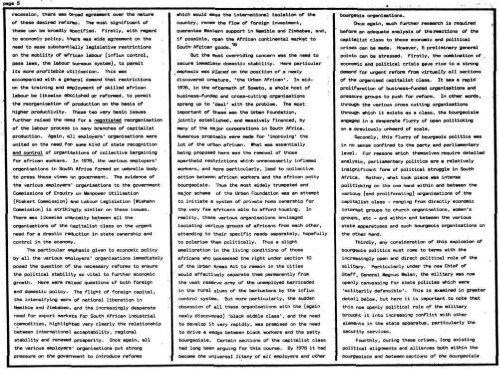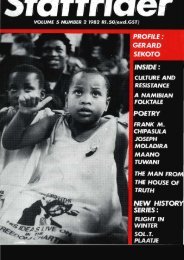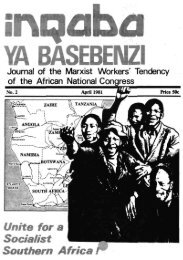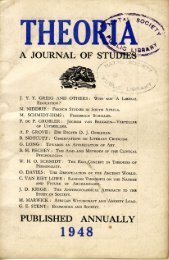You also want an ePaper? Increase the reach of your titles
YUMPU automatically turns print PDFs into web optimized ePapers that Google loves.
page 5<br />
recession, tnern was broad agreement over the nature<br />
of tots* desired reforms* The Most significant of<br />
these can ba broadly specified. Firstly, aith raganl<br />
to aconomlc policy, there was wide agreement on tha<br />
naad to ease substantially legislative raatrictions<br />
on tha mobility of african labour (influx control,<br />
pass lava, tha labour bureaux system), to permit i<br />
its mora profitable utilisation. This aas<br />
accompanied alth a general damand that raatrictions<br />
on the training and employment of skilled african<br />
labour ba likewise aboilahad or rafor mad, to parmlt<br />
tha reorganisation of production on tha basis of<br />
highar productivity. Thasa two vary basic issues<br />
further ralsad tha naad for s negotiated reorganisation<br />
of tha labour procasa in many branchas of capitalist<br />
production. Again, all employers' organisation* vara<br />
united on the naad for some kind of state recognition<br />
end control of organisations of collective bargaining<br />
for african workers* In 197S, the various employers*<br />
organisations in South Africa formed an umbrella body<br />
to press these views on government. The evidence of<br />
tha various employers* organisations to tha government<br />
Commissions of Enquiry on Manpower Utilisation<br />
(Rlekert Commission) and Labour Legislation (Vlehahn<br />
Commission) is strikingly similar on these issues.<br />
There aas likewise unanimity between all the<br />
organisations of the capitalist class on the urgent<br />
need for e drastic reduction in state ownership and<br />
control In the economy.<br />
The particular emphasis given to economic policy<br />
by all the various employers' organisations iamediately<br />
posed tha question of the necessary reforms to ensure<br />
the political stability so vital to further economic<br />
growth. Here were raised questions of both foreign<br />
and domestic policy. Tha flight of foreign capital,<br />
the intensifying wars of national liberation in<br />
Namlble and Zimbabwe, and the increasingly desperate<br />
need for export markets for South African industrial<br />
commodities, highlighted very clearly the relationship<br />
between International acceptability, regional<br />
stability and renewed prosperity. Once again, all<br />
the various employers* organisation* put strong<br />
pressure on the government to Introduce reforms<br />
which would emee the international leoletion of the<br />
country, renew th« flow of foreign investment,<br />
(Marwntee Western support in Namibia and Zimbabwe, and,<br />
if possible, open the African continental market to<br />
South*African goods.<br />
But tha most overriding concern was tha need to<br />
secure Immediate domestic stability. Hare particular<br />
emphasis was placed on tha position of a newly<br />
discovered creature, 'the Urban African'. In mid-<br />
1976, in the aftermath of Soweto, e whole host of<br />
business-funded and cross-cutting organisations<br />
sprang up to 'deal' with the problem. The most<br />
Important of these was tha Urban Foundation,<br />
jointly established, and massively financed, by<br />
many of the major corporations in South Africa*<br />
Numerous proposals warm made for 'Improving' the<br />
lot of the urban african* that was essentially<br />
being proposed here was the removal of those<br />
apartheid restrictions which unnecessarily inflamed<br />
workers, and more particularly, lead to collective<br />
action between african workers and the african patty<br />
bourgeoisie. Thus the most widely trumpeted and<br />
major scheme of the Urban Foundation was an attempt<br />
to initiate a system of private home ownership for<br />
the very few Africans able to afford housing. In<br />
reality, thes* various organisations envisaged<br />
isolating various groups of efricans from each other,<br />
attending to their specific needs separately, hopefully<br />
to polarise them politically. Thus a slight<br />
amelioration in the living conditions of those<br />
africans who possessed the right under section 10<br />
of the Urban Areas Act to remain in the cities<br />
would effectively separate them permanently from<br />
tha vast reserve army of the unemployed barricaded<br />
in the rural slums of the bantustans by tha influx<br />
control system. But more particularly, the sudden<br />
obsession of all these organisations with the (again<br />
newly discovered) 'black middle cless', and the need<br />
to develop it very rapidly, was premised on the need<br />
to drive a wedge between black workers and the petty<br />
I bourgeoisie. Certain sections of the capitalist claas<br />
I had long been arguing for this course. By 1978 It had<br />
I become the universal litany of all employers and other<br />
bourgeois organisations.<br />
Once again, much further research le required<br />
before an adequate analysla of tharaectlons of the<br />
capitalist class to these aconomlc and political<br />
crises can be made. However, 5 preliminary general<br />
points can be stressed. Firstly, the combination of (<br />
economic and political crisis gave rise to a atrong<br />
demand for urgent reform from virtually all sections<br />
of tha organised capitalist class. It earn a rapid<br />
proliferation of business-funded organisations and<br />
pressure groups to push for reform. In other words,<br />
through the various cross cutting organisations<br />
through which it exists as a class, tha bourgeoisie<br />
engaged in a desperate flurry of open politicking<br />
on a previously unheard of scale.<br />
Secondly, this flurry of bourgeois politics was<br />
in no sense confined to the party and parliamentary<br />
level. For reasons which thaajselves require detailed<br />
analysis, parliamentary politics are a relatively<br />
insignificant form of political struggle In South<br />
Africa. Rather, what took place aas intense<br />
politicking on the one hand within and between the<br />
various (and proliferating) organisations of the<br />
capitalist class - ranging from directly economic<br />
interest grouos to church organisations, women's<br />
group*, etc - and within and between the various<br />
state apparatuses and such bourgeois organisations on<br />
the other hand.<br />
Thirdly, any consideration of this explosion of<br />
bourgeois politics must come to terms with the<br />
increasingly open and direct political role of tha<br />
military. Particularly under the new Chief of<br />
Staff, General amgrws Helen, the military ems now<br />
openly canvassing for state policies which ware<br />
'militarily defensible'. This is examined In greater<br />
detail below, but here it is Important to note that<br />
this now openly political role of the military<br />
brought it into increasing conflict with other<br />
elements In the state apparatus, particularly the<br />
security services.<br />
Fourthly, during these crises, long existing<br />
political alignments and alliances both within the<br />
bourgeoisie end between sections of the bourgeoisie

















